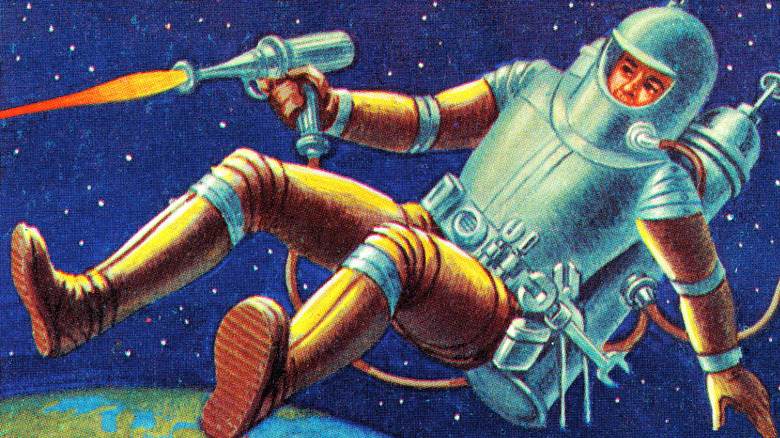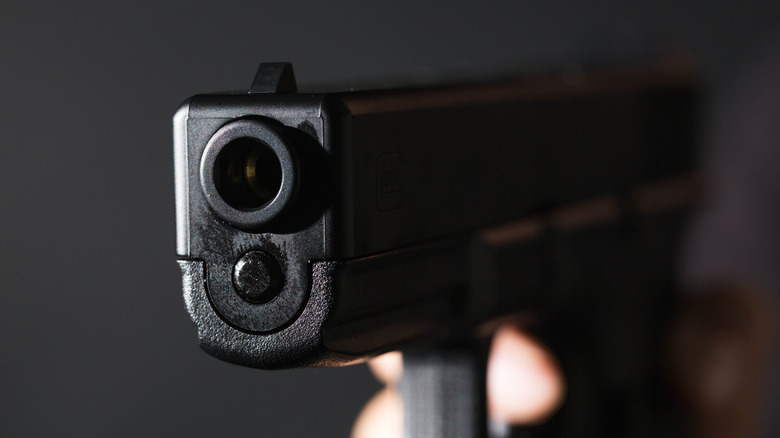The Unsettling Truth About What Happens When You Fire A Gun In Space
Science fiction movies tend to involve a lot of fighting. It's called "Star Wars," after all, not "Star Times of Peace and Harmony," and whether it's interplanetary warfare or alien invasions, you can almost guarantee there will be some bang-bang action in a sci-fi movie. Well, not exactly bang-bang action, as you've probably noticed that space weaponry is rarely, if ever, depicted with bullets. Lasers tend to be the ammunition of choice, even though in our reality, a laser gun is a type of thermometer. Part of the reasoning for this is just that lasers look cool, but there are also some technical issues, because firing a gun in the vacuum of space wouldn't work like it does on Earth.
There is a misconception that guns would not work at all in space because it takes oxygen to spark the gunpowder, which in turn propels the bullet. This would have been the case with older firearms, but modern bullets contain oxidizing chemicals that trigger the gunpowder, meaning even in a vacuum, you can still fire a bullet successfully. At least, that's true in theory, but conditions in space are highly variable. Some regions are so cold that the primer couldn't go off or the metal parts could jam. On the other hand, some regions of space receive so much solar radiation that bullets would explode before you could even load them. Assuming conditions weren't so extreme, a gun could fire perfectly well in space, but still, the consequences would be very different.
In space, no one can hear your gunshot ... and the bullet won't ever, ever stop
The first difference you would notice shooting a gun in space as opposed to on Earth would be the lack of a bang. Sound waves can move through any material, but matter is so sparse in open space that it doesn't really count as a material. A bullet would emerge with utter silence. Even though space is far less dense than Earth's atmosphere, the bullet wouldn't move any faster than it would on turf. It would travel a lot further, however, because there would be a lot less gravity to pull the bullet from its trajectory. On Earth, a bullet fired by a person of average height would fly for just under one second before gravity brings it to the ground. In space, it could travel infinitely.
A bullet fired in space could be stopped if it was drawn into a planet's orbit or hit something like an asteroid or satellite, but otherwise, it will continue until the bullet runs out of energy. There is so little matter in space to create resistance, that a bullet fired at 1,000 meters per second (2,237 miles per hour) would take 300 billion years and 100 trillion miles to lose all of its energy. Even then, the bullet would not reach the end of the universe because the universe is expanding faster than a bullet can travel. That expansion also causes what little matter there is in space to spread out further, which could potentially lead to so little resistance that a bullet would never, ever stop.
The same force that propels a bullet forward in space will also kick the shooter backward
Firing a gun in space would obviously harm anything that comes into the bullet's path, but it would also be dangerous to the person taking the shot. Anyone who has ever fired a gun knows how powerful the kickback can be. If you aren't ready and steady, it could even knock you off your feet. In space, however, there is no gravity to hold you steady, leaving you at the mercy of the bullet's force. This brings us to Newton's laws of motion, the third of which says that every action creates an equal and opposite reaction.
If you fire a gun in space, the force that propels the bullet forward would propel you backwards with equal force. You wouldn't move nearly as fast as the bullet because humans are vastly more massive than bullets. While the ammunition whizzes at 1,000 meters per second, you'd fly backwards at a rate of a few centimeters per second. But still, Newton's third law would apply, and unless an obstacle stops you in your path, you would keep floating backwards until long after you were nothing but a corpse in a spacesuit.
The most absurd possible outcome of shooting a gun in space would be if you were in orbit around a planet and fired at just the right altitude for the bullet to circle the planet and come right back around to shoot you in the back. This would require incredible aim, but it is technically possible. Now there's something wild for the sci-fi films.


